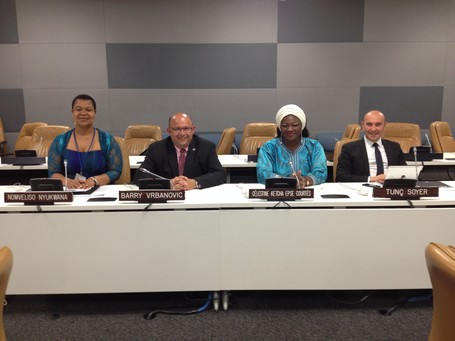
The President of the UN Economic and Social Council, H.E. Mr. Martin Sajdik, opened the UN Development Cooperation Forum in New York (10 – 11 July) by calling for challenging interventions. He referred to the intervention made by UCLG Champion Célestine Ketcha Epse Courtès, Mayor ofBagangté (Cameroon) during the past High Level Symposium in March 2014 in Berlin, where she criticized the lack of consultation of local governments which led to inefficient programmes designed at the national level.
UCLG Champion Mayor Nomveliso Nyukwana (Emalahleni Municipality, South Africa) replied: “Local governments are on the frontline of dealing with development challenges, and identify solutions to these challenges. It is therefore only natural that they take a leading role in the elaboration of development strategies.”
Practical cases
Mayor Nyukwana, and her fellow UCLG Champions, Councillor Berry Vrbanovic (Kitchener, Canada), Queen Mother Mayor Ketcha and Mayor Tunç Soyer of Seferihisar (Turkey) showed with examples that it is important to ensure that local governments are strengthened to participate in the design, implementation and follow up of national development plans and that local government development cooperation can be an effective tool to achieve this strengthening.
Other participants of the DCF supported the call for concrete cases and gathering of data at the local level, to learn from each other and to identify why some countries are making good progress in fighting poverty, while others are facing more challenges. In this regard, it was stressed that practical solutions at local level can be brought to the national and international level.
Enabling environment and accountability
Representatives from the private sector stressed the fact that there should be more attention for governance, rule of law and anti-corruption to enable the sector of Small and Medium sized enterprises to grow. In some countries, there are meetings at national or local level between the private sector and political representatives to discuss issues such as security and taxes to create an enabling environment for business opportunities.
There was attention for ensuring that policy reforms are being documented that can lead to effective development cooperation and to ensure that monitoring frameworks are embedded into national accountability systems.
Localizing the post 2015 agenda
“The post 2015 agenda will remain a government driven process, but it should become more inclusive, through public private partnerships or other combinations. Lessons learned should be integrated. Successful partnerships are generally focussed on finding solutions. Community ownership is important for accountability. A data revolution is needed at local and national level”, said Ms. Bethel, Head of Cabinet of the President of the General Assembly, during the plenary session on Friday.
UNDP Art and UCLG co-organized a side event in the framework of the DCF, which focused on the important role of local governments in development cooperation and on the importance that this kind of cooperation is complementary to other relevant sources of support. The session concluded that it is important that this instrument be added as one of the ways to achieve the post 2015 development goals.
Development Cooperation Forum
The Development Cooperation Forum, organized by the UN Economic and Social Council, was created in response to the deep changes in the development cooperation landscape and the growing number of development cooperation actors. The Forum is organized biennially and reviews trends in international development cooperation while bringing together representatives from national governments of developing and developed countries, parliamentarians, civil society organizations, local governments, private sector and foundations.
The Champions participated in the plenary sessions of the DCF and in the side events organized by UCLG and UNDP Art and the Global Partnership on Effective Development Cooperation.
Source: Capacity and Institution Building Working Group - UCLG Champions










